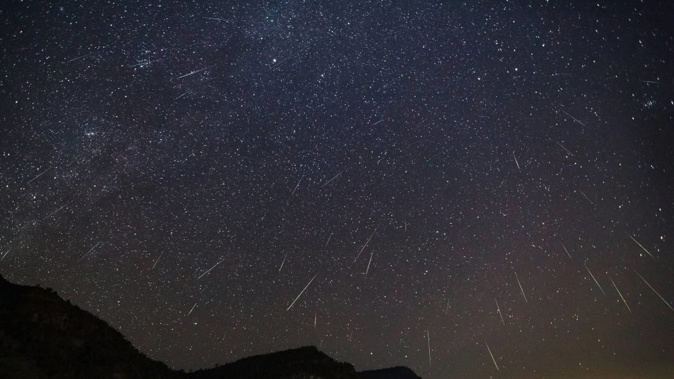
Felix Walton of RNZ
An enormous fireball seen over the North Island during the weekend has astronomers scrambling to find the meteorite.
Local meteor-tracking organisation Fireballs Aotearoa said the meteor was likely to have landed in Northland, and could be just the tenth meteorite Kiwi scientists have found in the past 150 years.
On Saturday morning, witnesses across the upper-North Island spotted a green streak, followed by a bright orange light and a sonic boom. It lasted just 6 seconds, but left quite an impression.
A Northland farmer was the first person to report a sighting. “I turned around thinking it was a vehicle on the road behind me,” they wrote. “It’s by far the biggest event I’ve seen in the night sky, and I’ve spent a lot of hours following cows in the dark.”
/cloudfront-ap-southeast-2.images.arcpublishing.com/nzme/GOK7CBZAZVH2DHQ5RN6L3QRPSY.jpg)
Bright meteor from Perseids meteor shower. Photo / File
Geologist James Scott, a member of Fireballs Aotearoa, said the meteor could have left another kind of impression. “We think this one may have actually dropped a meteorite,” he said. “Enough material could have survived that fireball stage that a meteorite may have landed somewhere between Dargaville and Whangarei.”
Scott said that with enough information his team could track it down.
“We have imagery from three security cameras, but of course there are far more that would’ve caught it.
“If we had enough imagery we could probably triangulate, quite precisely, where that meteorite fell.”
One of those videos was caught by Logan Carpenter, an amateur astro-photographer based in Auckland. But the astronomy fan had his back turned as the rock soared overhead.
“I was actually imaging with my telescope at the time,” he said. “But I had the telescope pointing in a different direction.”
It was the next day when Carpenter learned what he had missed.
“My wife was looking at the security cam the next day and said: ‘What’s that glowing in the sky?’.”
It was the first time he had seen a meteor of that size.
“As soon as I saw it I thought, gosh that looks like a fireball.
“I was quite excited to see it because I’ve captured meteors before, little ones, but never a fireball.”
Stardome astronomer Josh Aoraki said the biggest barrier to finding meteorites was knowing they had fallen in the first place.
“You have to know they’re actually falling to the Earth.
“A lot of meteors would probably happen during the day, so we wouldn’t even see them, and even if they do reach the ground sometimes there’s just no witnesses so we have no idea.”
Getting hands-on with a genuine space rock would be a truly special opportunity, he said.
“These rocks date back to billions of years ago, so they’re like time capsules.
“[Addressing] those bigger questions of: Where does it all come from?”
Scott encouraged people to check their security footage and submit it to help narrow down the landing zone. He hoped New Zealand’s scientific community would get a chance to investigate the meteorite.
“These things are particularly significant because they provide information about the solar system,” he said. “They’re a real scientific gold mine if you can get your hands on them, and New Zealand has very few.”
He hoped nobody would steal the meteorite for themselves.
“We hope they would donate it to a museum where people could actually look at it and interpret the history it has within it,” he said. “They’re much more valuable to science than they are to people.”
“If people wanted a meteorite they could probably buy a pretty good one on the internet.”
Take your Radio, Podcasts and Music with you








